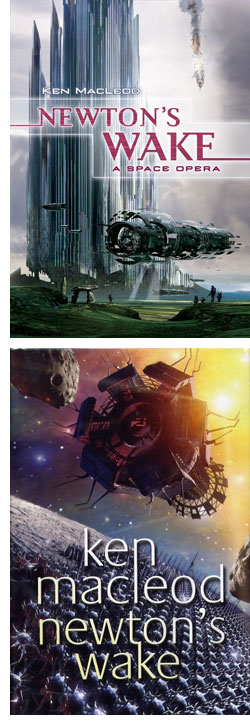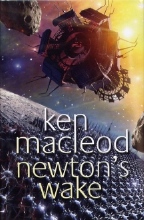Newton's Wake: A Space Opera
Orbit
UK Hardcover First
ISBN 1-841-49175-6
Publication Date: 03-04-2004
384 Pages; £17.99
|
|
Newton's Wake: A Space Opera
Tor
US Hardcover First
ISBN 0-765-30503-8
Publication Date: 06-01-2004
320 Pages; $24.95
Date Reviewed: 06-01-2004
Reviewed by Rick Kleffel © 2004
|

|
|
REFERENCES
|
COLUMNS
|
|
Science Fiction
|
01-25-02, 02-11-02, 02-14-02, 10-03-02, 12-13-02, 02-25-03, 07-12-03
|
With science fiction the future's the thing. Whiz-bang, we're in
the twenty-third century; or the twenty-fifth century; or thirty-five
years in the future. And so, dropped in the future, surrounded by the
future, and headed for the future in the future, it's easy to neglect
the past. But the past is there, all right; even in the future.
There's that mysterious time, for the reader, between now -- the time
when the reader is opening the book -- and the future, or that point
in the future when the story begins.
That segment of time -- the future's past, and the present's
future -- does require some definition. Indeed, that's the propelling
force for many a science fiction novel; how did our world become this
world? And having become this world, what might it next become? Few
writers have such a mastery of blending the past, present and future
as Ken Macleod. However, in his previous work, readers have been
required to invest in a series to fully enjoy the breadth of his
clever historical revisions. Now that experience is available to
novice readers and fans alike, in his first standalone work,
'Newton's Wake: A Space Opera'. Full of the same low-key and
intelligent humor as his other work, 'Newton's Wake' lives up to its
subtitle and then some. Macleod stuffs his space opera so chock full
of ideas, riffs and references that readers will constantly enjoy the
pleasant feel of incipient information overload. 'Newton's Wake' has
the grand arc, the huge characters and the rigorous structure of any
musical opera and also offers the light comedic touches one
associates with the wittiest of Mozart's works. All this while
casually slagging Microsoft; once again, Macleod demonstrates his wit
with bracing brevity.
'Newton's Wake' begins as a bit of "combat archaeology" goes bad.
The Carlyle Clan pretty much owns the wormhole network that connects
the known universe. When Lucinda Carlyle steps through the gate on
the planet Eurydice, she knows that she's found a planet worth
snagging. But when she blunders into an ancient artifact on the
planet, she triggers a machine that threatens to disassemble the
Universe as she and humanity now know it. Just how -- and what --
they know are the mysteries that will pull readers through one
brain-boggling escapade after another.
Macleod lets us know early on that sometime after now, the
military AI's of earth took charge in what is referred to as the
"Hard Rapture". Some humans remained, some went running, some made
bargains and some simply disappeared into the machines. Who went
where and why is not clear, at least not at first. The great fun of
'Newton's Wake' is twofold. There's the science-fictional joy of
finding out the complex history of Macleod's future while the end
result of that history is dismantled right before the characters'
--and the readers' eyes. Then there's the linguistic construct -- the
novel 'Newton's Wake' -- that Macleod offers as a document of those
events. The language in 'Newton's Wake' is a pure and complex joy, a
mélange of ping-ponging, self-referential jokes and jargon
that's so dense it might take a work of non-fiction equally long --
or longer -- to explain. But the joy is that readers will experience
all the erudition of that non-existent work of non-fiction in the
space of a couple of packed paragraphs in Macleod's enjoyable tale.
The plot that unfolds in Macleod's future is complex and
mysterious. What's happening is inexplicable even to those who are
experiencing it; and every time the reader is just about caught up
with the future's past, another element of the future's present
throws that past into utter doubt or an entirely different light.
Lies, myths and misunderstandings fragment the plot then click
together with smooth precision. It's a breathtaking performance and a
reading experience that has no parallel. Macleod's world is so packed
with details that detain the reader in a techno-backwater or an
isolated cutting-edge camp, there's little time to catch your reading
breath. But Macleod doesn't disappoint when it comes time to put the
picture together. He doesn't over-explain and he doesn't wave his
hands. There's a light at the end of the tunnel, and whether it's a
train or the light of day, you'll be happy to hit it at faster than
the speed of light. This novel is after all titled 'Newton's Wake';
and that wake is celebrating the end of physics and science fiction
as we think we know it.
Macleod doesn't let his characters get lost in all this
scintillating intellectual action. From the unfortunate Lucinda
Carlyle to the unforgettable resurrected folksingers, Winter and
Calder, Macleod gives us humans we can cling to in the chaos of a
future that's all the more alien for being the sole work of humans.
He even gives his machines a character we can clutch; whether it's
Shlaim, the human ghost resurrected to act as a virtual slave within
a spacesuit or The Hungry Dragon, a starship infected with a viral
intelligence, Macleod makes his machines as canny as the humans who
inhabit them.
But beyond the complex and shiny surface of 'Newton's Wake',
there's a universe of subtext that's every bit as compelling as the
story itself. Macleod peppers the reader with jokes and references in
every sentence, every paragraph. Nobody in the past, present or
future of fiction and science fiction emerges unscathed or
unmentioned. Macleod is canny enough to make sure that none of his
cleverness gets in the way of the story. But 'Newton's Wake' is like
one of those complicated pictures that proves itself to be composed
of equally complicated pictures. Like it or not, there's an army of
grad students waiting to write dissertations on Macleod's work. In
the interim, the average reader can just sit back, enjoy the ride and
love the language.
'Newton's Wake' does not tread a lot of new territory for Macleod,
but it puts a lot of that territory into a concise, ultra-dense
package that unfolds and then unfolds again. The politics are here,
the present is here, both in Macleod's backwater interstellar
settlements and in the mystery of the Hard Rapture, and the future is
here in all its gleaming, shiny glory. Readers will be scratching
their heads one minute and jumping for joy the next, flash to the
future and blast to the past. It's all there --now. Macleod uses the
lowest of technology, the most primitive of entertainments -- the
novel -- to take the reader father than any high-tech virtual
reality. In Macleod's mind, in his work, words are the next -- and
the final -- frontier.

